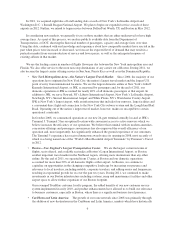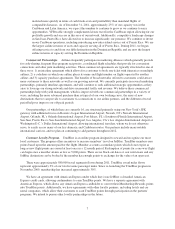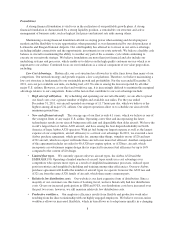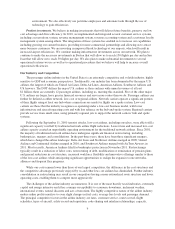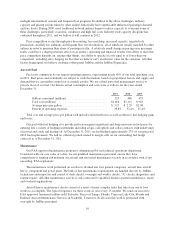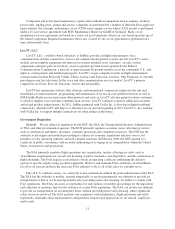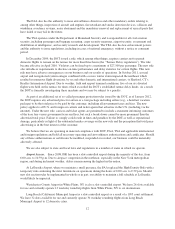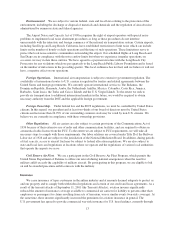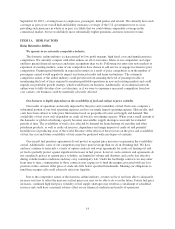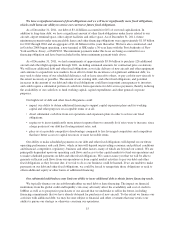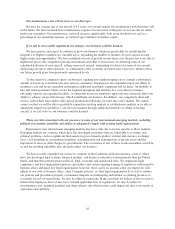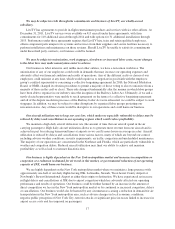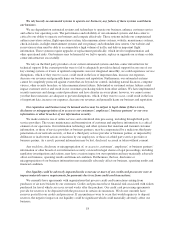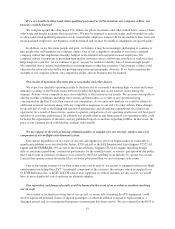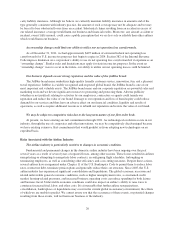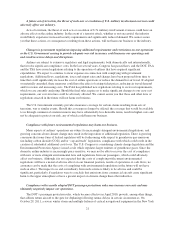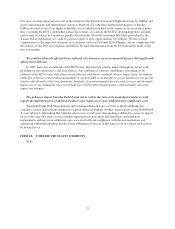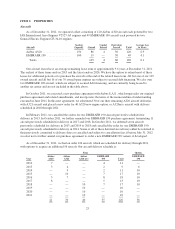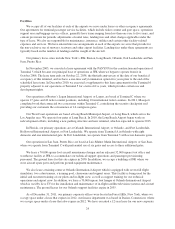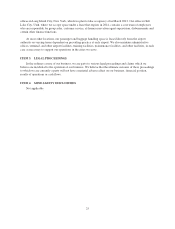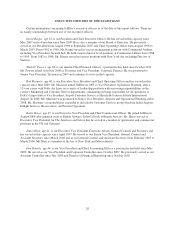JetBlue Airlines 2011 Annual Report Download - page 26
Download and view the complete annual report
Please find page 26 of the 2011 JetBlue Airlines annual report below. You can navigate through the pages in the report by either clicking on the pages listed below, or by using the keyword search tool below to find specific information within the annual report.Our maintenance costs will increase as our fleet ages.
Because the average age of our aircraft is 6.1 years, our aircraft require less maintenance now than they will
in the future. We have incurred lower maintenance expenses because most of the parts on our aircraft are under
multi-year warranties. Our maintenance costs will increase significantly, both on an absolute basis and as a
percentage of our operating expenses, as our fleet ages and these warranties expire.
If we fail to successfully implement our strategy, our business could be harmed.
We have grown, and expect to continue to grow our business whenever practicable, by modifying the
frequency of flights to markets we currently serve, expanding the number of markets we serve and increasing
flight connection opportunities. We have modified our rate of growth several times over the past few years due to
higher fuel prices, the competitive pricing environment and other cost increases, by deferring some of our
scheduled deliveries of new aircraft, selling some used aircraft, terminating our leases for some of our aircraft,
and leasing aircraft to other operators. A continuation of the economic downturn may cause us to further reduce
our future growth plans from previously announced levels.
To the extent we continue to grow our business, opening new markets requires us to commit a substantial
amount of resources even before the new services commence. Expansion is also dependent upon our ability to
maintain a safe and secure operation and requires additional personnel, equipment and facilities. An inability to
hire and retain personnel, timely secure the required equipment and facilities in a cost-effective manner,
efficiently operate our expanded facilities, or obtain the necessary regulatory approvals may adversely affect our
ability to achieve our growth strategy, which could harm our business. In addition, our competitors often add
service, reduce their fares and/or offer special promotions following our entry into a new market. We cannot
assure you that we will be able to profitably expand our existing markets or establish new markets or be able to
adequately temper our growth in a cost effective manner through additional deferrals or selling or leasing
aircraft; if we fail to do so, our business could be harmed.
There are risks associated with our presence in some of our international emerging markets, including
political or economic instability and failure to adequately comply with existing legal requirements.
Expansion to new international emerging markets may have risks due to factors specific to those markets.
Emerging markets are countries which have less developed economies that are vulnerable to economic and
political problems, such as significant fluctuations in gross domestic product, interest and currency exchange
rates, civil disturbances, government instability, nationalization and expropriation of private assets and the
imposition of taxes or other charges by governments. The occurrence of any of these events in markets served by
us and the resulting instability may adversely affect our business.
We have recently expanded our service to countries in the Caribbean and Latin America, some of which
have less developed legal systems, financial markets, and business and political environments than the United
States, and therefore present greater political, legal, economic and operational risks. We emphasize legal
compliance and have implemented policies, procedures and certain ongoing training of employees with regard to
business ethics and many key legal requirements; however, there can be no assurance that our employees will
adhere to our code of business ethics, other Company policies, or other legal requirements. If we fail to enforce
our policies and procedures properly or maintain adequate record-keeping and internal accounting practices to
accurately record our transactions, we may be subject to sanctions. In the event that we believe or have reason to
believe that employees have or may have violated applicable laws or regulations, we may be subject to
investigation costs, potential penalties and other related costs which in turn could negatively affect our results of
operations and cash flow.
16


